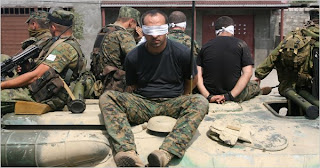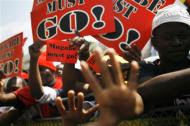
Georgia — Russia showed small signs of moving a few troops away from Georgia on Tuesday. But Russia retained its grip on the country, and Russian forces bound and blindfolded 21 Georgian soldiers at the Black Sea port of Poti, parading them with five seized Humvees belonging to Georgia’s backers — the United States.
Two days after President Dmitri A. Medvedev of Russia promised that the pullout would begin, there were signs of movement, however minor. A platoon of armored infantry moved away from Georgia through the narrow mountain passes on the Russian side of the border. Near the central city of Gori, Russia and Georgia exchanged prisoners, including two Russian pilots who had been shot down by Georgian forces.
Yet a Russian engineering platoon was also building reinforced trenches for a checkpoint just north of Gori, suggesting that Russian troops expected to be in Georgian territory for some time.
Russian armored vehicles held high ground overlooking Gori and Igoeti, and a network of Russian forces took up positions along Georgia’s main highway. Some of the troops who on Monday packed their equipment and said they were ready to leave Gori had unpacked and moved back to checkpoints at the city’s edge.
A large part of the conflict area remained lawless and in need of water and food, several residents remaining in four villages said.
In Tkviavi, a Georgian village near Tskhinvali, the capital of South Ossetia, most of the remaining Georgian residents were in hiding, fearful of looters. The foul smell of bodies decomposing in the heat emanated from several houses on the main thoroughfare, and residents had buried several victims in basements and courtyard gardens.
Perhaps the most telling image of the day came from Poti, where, after a four-hour blockade of the port, the Russians transported Georgian soldiers in white blindfolds on top of armored personnel carriers. They drove their captives in a show of force past a crowd of residents, some of whom shouted “Swine! Swine!” at the Russians.
They went to the Georgian military base they had occupied in Senaki with a caravan of seized American Humvees, which later appeared to move down the road toward Abkhazia, deep in Russian-held territory. A local priest in black Eastern Orthodox robes entered the base, seeking to negotiate the soldiers’ release.
In the west of Georgia, far from the center of the conflict in South Ossetia, Russian forces have maintained an overt presence. Russian soldiers patrol villages daily with tanks and armored personnel carriers and have deployed artillery along major highways between Abkhazia and Poti, where a Russian bomb attack about a week ago killed seven civilians.
“They want everything — our bases, our ports, our roads,” said Shalba Kuchava, a driver for the port, who waited outside in the hope that the men would be freed.
A top Russian military official said the Georgians had been detained at a checkpoint, armed and driving the Humvees, in what he contended was a violation of the six-point cease-fire agreement brokered last week by President Nicolas Sarkozy of France.
But the Georgians said that the soldiers were guarding the port against looters, and that the Humvees were United States property that had been used in a joint exercise this year. They said the vehicles had been packed in a container at the port, ready to be shipped back to the United States.
Col. Gen. Anatoly Nogovitsyn, the deputy chief of the Russian general staff, said that Russia would lay claim to whatever Georgian armaments it considered useful.
“We will not leave a single barrel, a single cartridge for Georgia, which initiated this bloodshed,” General Nogovitsyn said in an interview with the Interfax-AVN news agency.
“Part of these arsenals, especially ammunition, will be destroyed and are already being destroyed,” he said. “And as for the rest of the war trophies, we will use them as we please, in particular will take for ourselves part of the tanks and other armored vehicles that are in good condition.”
Bernard Kouchner, the French foreign minister, said his country was “very disappointed” that Russia had not withdrawn its troops from Georgia, as agreed in the cease-fire he helped negotiate.
“Three times Medvedev has said they are starting the withdrawal, and they have not,” he said Tuesday. “We cannot accept this kind of blindness, not accepting international law and their own words.”
General Nogovitsyn said that Russian troops would be pulled out from the rear, beginning with heavy combat equipment, and that movement out of Georgia would speed up Friday. But Russian forces were building new checkpoints on Tuesday a few miles north of Gori, using backhoes to cut deep trenches and cranes to stack concrete blocks into barricades at the edge of the town of Karaleti.
The new Russian checkpoints seemed to be consistent with information the Russian Foreign Ministry released on Monday, which clarified the scope of its pullback.
A 1999 document written by the Joint Control Commission, an international body that monitored tensions in South Ossetia, the breakaway enclave over which hostilities between Russia and Georgia flared this month, gives peacekeepers access to a “security corridor” that extends about five miles in each direction from the enclave’s perimeter.
Under that document, the corridor reaches into Georgian-held territory, including portions of the country’s main east-west highway, and right through Karaleti.
Mr. Medvedev has said Russian peacekeepers will pull back from other Georgian territory but remain inside the security corridor.
Mr. Sarkozy amended the cease-fire agreement to state that Russia was not permitted to occupy urban areas or block main roads.
Even so, this interpretation would grant Russian forces an unprecedented position in central Georgia, said Sabine Freizer, who has monitored events in Georgia for the International Crisis Group, an organization that seeks to stop deadly conflicts.
“It’s a complete shift, because in practice, Russian troops have never crossed into Georgia,” said Ms. Freizer, the organization’s Europe director.
At the United Nations on Tuesday the Security Council considered a new, abbreviated resolution demanding that Russia withdraw all of its troops from Georgia.
But during the acrimonious session, Vitaly Churkin, Russia’s ambassador to the United Nations, declared that his nation could not support a resolution that did not endorse all six points of the cease-fire agreement, which he said should be included “verbatim.”
Momentum on an earlier resolution stalled, also over Russian objections, the diplomat said. As one of the five permanent Council members, Russia wields veto power over resolutions.
In Moscow, the leader of Russia’s Federal Security Service said Tuesday that he had received intelligence about Georgian-planned terrorist attacks on Russian soil, and had tightened security at transportation hubs, industrial plants and densely populated areas in Russia’s southernmost district, Interfax reported.
Meanwhile, the Organization for Security and Cooperation in Europe agreed to immediately add 20 international monitors to the 8 already in place in South Ossetia.
The new monitors will be allowed in the region adjacent to South Ossetia, and could begin to arrive Thursday, said Martin Nesirky, a spokesman for the organization.
source : www.nytimes.com
 TOKYO, Japan (AP) — Two strong earthquakes rattled Asia on Thursday, triggering alerts for a tsunami that harmlessly lapped Japan's northern coast and another in Indonesia that didn't materialize but briefly sent residents fleeing to high ground.
TOKYO, Japan (AP) — Two strong earthquakes rattled Asia on Thursday, triggering alerts for a tsunami that harmlessly lapped Japan's northern coast and another in Indonesia that didn't materialize but briefly sent residents fleeing to high ground.












